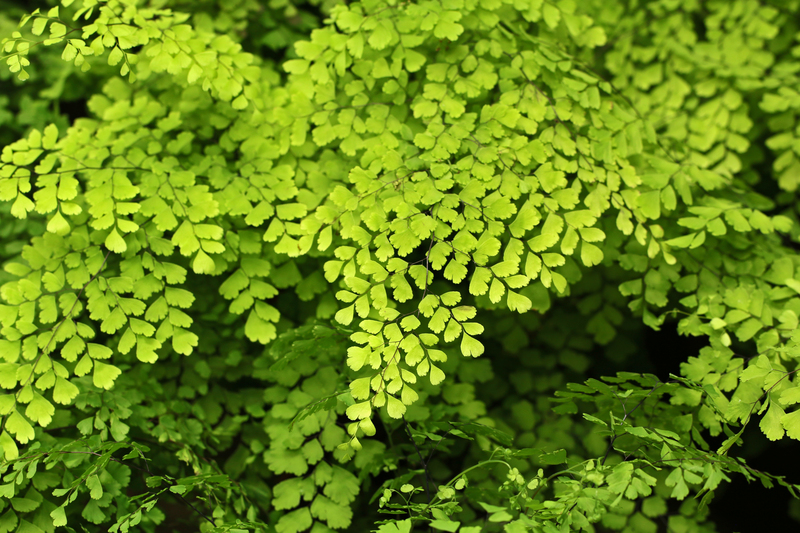Converting Waste into Soil's Superfood
Posted on 22/08/2025
Converting Waste into Soil's Superfood: Transforming Waste for a Greener Future
In an era of climate change and sustainable growth, finding revolutionary ways to reuse and recycle is more than a trend--it's a necessity. One of the most powerful solutions is converting waste into soil's superfood. This organic approach goes beyond reducing landfill overflow; it nurtures depleted soils, boosts crop yields, and supports a thriving ecosystem. In this comprehensive guide, we'll explore how waste can become a rich superfood for soil, how you can participate, and the far-reaching benefits of this green transformation.
What Does "Soil's Superfood" Mean?
Before diving into the methods of turning waste into soil superfood, it's important to understand this term. Just like people need nutritionally dense foods for health, soil thrives when nourished with organic matter high in nutrients, beneficial microbes, and carbon. "Soil's superfood" refers to rich, biologically active matter--such as compost, vermicompost, and biochar--created from plant and food waste. These materials help restore soil fertility, improve structure, and feed the microorganisms that make soils healthy and resilient.

Why Convert Waste Into Soil's Superfood?
- Reduces landfill volume: Up to 40% of municipal waste is organic.
- Lowers methane emissions: Organic waste in landfills creates harmful methane.
- Restores soil health: Organic amendments replenish lost nutrients and carbon.
- Promotes circular economy: Waste becomes a valuable local resource, closing the nutrient loop.
- Protects water systems: Healthy soils retain nutrients, minimizing runoff and pollution.
Understanding Different Types of Waste for Soil Enrichment
Not all waste is created equal, especially with soil enrichment from waste materials. The most suitable types for conversion into soil superfood are:
- Food scraps: Fruit and vegetable peels, coffee grounds, eggshells.
- Yard trimmings: Leaves, grass clippings, twigs.
- Agricultural residues: Crop stalks, husks, nutshells.
- Paper products: Uncoated paper, cardboard (in moderation).
- Some animal manures: Well-aged manure from herbivores.
Tip: Avoid fats, meat, dairy, and chemically treated materials for home composting--they attract pests and may harm soil health.
Methods for Turning Waste into Soil's Superfood
There are several tried-and-true ways to convert waste into nutrient-rich soil amendments, each with its unique advantages.
1. Traditional Composting: The Cornerstone of Waste Recycling
- How it works: Composting is a natural process where microorganisms break down organic waste in the presence of air, creating humus-rich compost.
- What's needed: Browns (carbon) like dry leaves or straw, greens (nitrogen) like food scraps, moisture, and air.
- What you get: Dark, earthy-smelling compost--nature's finest fertilizer.
Benefits:
- Enriches soil with nutrients
- Improves soil structure and water retention
- Encourages beneficial organisms
- Reduces need for chemical fertilizers
2. Vermicomposting: Harnessing the Power of Worms
- How it works: Special earthworms (often red wigglers) eat through waste, excreting "worm castings"--a potent soil amendment rich in plant-available nutrients and beneficial microbes.
- Advantages: Rapid breakdown, odorless process, and high-quality output that enhances soil fertility.
- Best for: Indoor bins, small spaces, schools, and homes.
Worm castings are considered a superfood for soil due to their high microbial diversity and the presence of growth enhancers like enzymes and plant hormones.
3. Bokashi: Anaerobic Fermentation for Food Waste
- Uses beneficial microbes to "pickle" organic waste in airtight buckets.
- Converts food (including small amounts of meat and dairy) into a pre-compost that can be safely buried in soil to complete decomposition.
- Boosts soil microbial activity and reduces nutrient losses.
Bokashi is ideal for urban dwellers and those who want to recycle a broader range of food waste, turning it into concentrated soil nourishment quickly.
4. Biochar: The Soil Superfood with a Carbon Bonus
- What is it? Charred agricultural or woody waste produced by heating in a low-oxygen environment.
- Enhances soil by improving water retention, hosting beneficial microbes, and sequestering carbon (mitigating climate change).
- Often used combined with compost or manure for optimum effect.
Biochar's porous structure not only traps nutrients and water but also provides refuge for microbes, supercharging degraded soils over years.
5. Municipal and Farm-Scale Composting
- Collects public and farm organic waste on a large scale.
- Processed in windrows or industrial systems to create commercial-grade compost.
- Feeds parks, fields, gardens on a community-wide level.
Such programs play a vital role in scaling up waste diversion and soil improvement across entire regions.
The Science Behind Soil Enrichment from Waste
When organic waste is transformed into soil amendments, the resulting materials become a "soil's superfood" for a few key reasons:
- Adds essential nutrients: Composting returns vital elements like nitrogen, phosphorus, potassium, and micronutrients.
- Feeds soil life: Organic matter is food for earthworms, fungi, and bacteria, all of which contribute to healthy soil ecosystems.
- Improves soil structure: Soil rich in organic material holds water, breathes better, and is less prone to erosion.
- Increases disease resistance: Healthy soils help plants fight off pests and diseases naturally.
Microbes: The Invisible Workforce
Microorganisms--bacteria, fungi, actinomycetes--break down waste and help form stable humus. Their populations thrive in soils enriched with compost, resulting in nutrient cycling, root growth, and improved plant health.
Practical Steps to Start Converting Waste at Home
1. Set Up a Compost System
- Choose a spot: Shady backyard corner or a sealed bin for patios and balconies.
- Layer carbon (browns) and nitrogen (greens) sources for balance.
- Turn the pile regularly for aeration and even decomposition.
- Keep moist but not soggy.
- Harvest finished compost when dark, crumbly, and earthy-smelling.
2. Try Vermicomposting Indoors
- Use a specialized worm bin, bedding (shredded paper, coconut fiber), and "red wigglers."
- Feed with small amounts of fruit and veggie scraps weekly.
- Harvest worm castings every few months for houseplants or gardens.
3. Join Community Composting or Municipal Programs
If space or time is limited, many communities offer drop-off sites or curbside pickup for organics. Some even return finished compost for gardening.
4. Experiment with Bokashi or Biochar
- Bokashi kits are available for home use--great for apartments.
- Biochar can be made locally or purchased, then mixed into your soil or compost pile.
The Benefits: Why Soil's Superfood Matters
Let's highlight the main benefits of converting waste into soil's superfood:
- Reverses soil degradation: With regular additions, depleted soils regain structure, fertility, and biological life.
- Healthy soil, healthy food: Nutrient-rich soil grows more nutritious fruits and vegetables.
- Climate action: Reduces landfill methane, locks away carbon in soil, and creates a closed-loop system.
- Protects pollinators and biodiversity by lowering chemical input.
- Economic savings: Free or affordable alternatives to synthetic fertilizers--great for farms, schools, and home gardeners.
Common Myths About Composting and Soil Amendments from Waste
- Compost stinks. Fact: Properly balanced compost smells earthy, not offensive.
- Too complicated or time-consuming. Fact: Basic systems can be low-maintenance and easy to manage.
- Attracts rodents. Fact: Bins with lids and no meat/dairy remain pest-free.
- Only big farms benefit. Fact: Anyone--even apartment dwellers--can join the movement.
How Waste-to-Soil Superfood Helps the Planet
Recycling organics into soil-enriching superfood has ripple effects beyond individual gardens.
- Massive landfill reduction: If every household composted, millions of tons of waste would be diverted annually.
- Flood and drought resilience: Healthy, humus-rich soils absorb more water and resist erosion.
- Restores carbon cycle: Soil is a vast carbon sink--we can actively help the climate by feeding it organic matter.
- Strengthens local food systems and reduces dependence on external inputs.
- Creates green jobs in soil management and compost industries.
Innovations and the Future of Waste Conversion
With growing environmental awareness, new technologies are emerging to elevate waste-to-soil processes:
- Smart composters: Automated home bins track moisture, temperature, and turn the pile for you.
- Microbial inoculants custom-tailored for specific waste types and climates.
- High-temperature "hot composting" techniques for faster results and safer pathogen kill.
- Municipal biogas plants capturing energy and fertilizer from waste.
In the agricultural sector, waste conversion is playing a critical role in regenerative agriculture--restoring soils, increasing yields organically, and safeguarding food systems for future generations. There's unprecedented opportunity for households, businesses, and governments to work together on scaling these solutions.

Getting Involved: Your Role in the Green Revolution
It's easier than ever to join the movement to transform waste into soil's superfood no matter your space or experience level. Here's how you can make a difference:
- Start a compost or worm bin at home.
- Check local composting programs: Participate in community sites, or subscribe to a collection service.
- Advocate for composting in schools, workplaces, or neighborhood associations.
- Support farmers and companies making organic soil amendments from waste.
- Educate others about the value of diverting food scraps and yard waste.
Conclusion: Cultivating a Greener, Healthier Tomorrow
Converting waste into soil's superfood isn't just a way to manage leftovers--it's a powerful action to heal the earth, grow better food, and fight climate change. With so many practical solutions available, every individual, business, and community can take steps to close the loop and foster resilient soils. Whether you start small or think big, your contribution matters in turning waste into the ultimate gift for our planet's future--nourished, living, thriving soil.
Frequently Asked Questions on Waste-to-Soil Superfood
- What materials should I avoid adding to compost?
Meat, dairy, oils, glossy paper, and diseased plants can cause problems or attract pests--stick to fruit, veg, paper, and yard trimmings. - How long does it take to make compost?
Depending on your method, compost can be ready in 2-6 months. Regular turning and the right balance of materials speed things up. - Is compost the only "superfood" for soil?
No! Vermicompost, biochar, leaf mold, bokashi, and manure are all potent ways to boost soil health through recycled waste. - Can compost improve clay or sandy soils?
Absolutely. Organic soil amendments from waste enhance both water retention in sandy soils and drainage in clay soils.
Ready to start converting your waste into soil's superfood? A greener tomorrow begins in your own kitchen or backyard--join the revolution today.
Latest Posts
Strengthen Your Garden's Defense Against Unforgiving Weather Patterns
Initial Steps to Rejuvenating an Abandoned Garden
Flavor at Your Fingertips: Herb Garden Mastery
The Path to Optimal Orchid Health
Inspire outdoor gatherings with stunning garden seating arrangements



